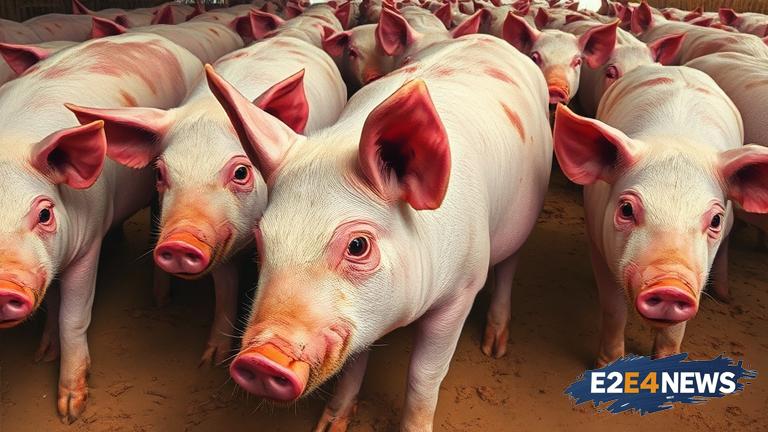African Swine Fever (ASF) has been wreaking havoc on pig populations worldwide, and the latest outbreak has resulted in the deaths of 7300 pigs. In an effort to contain the spread of the disease, 2900 more pigs have been culled. The outbreak has been reported in several countries, with the most recent cases emerging in Asia and Europe. The disease is highly contagious and can spread quickly through direct contact with infected pigs or contaminated feed and water. The symptoms of ASF include high fever, vomiting, and diarrhea, and can lead to death within a few days. The disease is not transmissible to humans, but it can have a significant impact on the pig farming industry. The World Organization for Animal Health (OIE) has been working to develop a vaccine for ASF, but so far, none have been proven to be effective. The OIE has also been providing guidance to countries on how to manage and control the outbreak. In addition to culling infected pigs, other measures to control the outbreak include restricting the movement of pigs and pig products, and increasing biosecurity measures on farms. Farmers have been advised to take precautions to prevent the spread of the disease, including disinfecting equipment and vehicles, and wearing protective clothing. The economic impact of the outbreak is significant, with many farmers facing financial losses due to the death of their pigs. The outbreak has also led to an increase in pork prices, making it more difficult for consumers to afford. The situation is being closely monitored by animal health authorities, who are working to contain the outbreak and prevent further spread. The use of drones and other technology is being explored to help track and monitor the movement of pigs and identify areas where the disease is present. The international community is coming together to share knowledge and expertise in an effort to combat the outbreak. Researchers are working to develop new diagnostic tools and treatments for ASF, and to improve our understanding of the disease. The outbreak has highlighted the need for increased investment in animal health infrastructure and research. It has also emphasized the importance of international cooperation and collaboration in addressing global health issues. The situation is complex and multifaceted, and will require a sustained and coordinated effort to bring under control. The impact of the outbreak will be felt for some time to come, and it is essential that we learn from this experience to prepare for future outbreaks. The development of a vaccine for ASF is a priority, and researchers are working tirelessly to achieve this goal. In the meantime, it is crucial that we continue to take measures to prevent the spread of the disease and support those affected by the outbreak. The global community must come together to address this crisis and work towards a solution. The fight against ASF is a long-term one, and it will require patience, persistence, and cooperation from all stakeholders. The consequences of inaction would be severe, and it is essential that we take immediate and sustained action to combat the outbreak.
